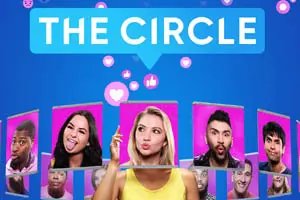The Circle subverts reality TV expectations and treats being fake on the internet like it’s normal
-

The buzzworthy social media-influenced Netflix reality show looks like a setup for the typical reality show drama. "But that’s because you haven’t gotten to the real premise of The Circle," says Aja Romano. "Improbable as it might seem, that premise boils down to a subversion of the famous reality TV code: What if everyone was here to make friends? Unlikely as it might sound, The Circle differentiates itself from other relationship-focused reality competition shows by emphasizing that, in fact, its contestants really like each other — or at least, they’re really good at pretending they do. It’s less Big Brother and more The Great British Compliment-Off. And Netflix viewers seem to have embraced it as genuine." Romano adds that one of the key's to The Circle's success is embracing inauthenticity as part of human nature. "Historically, one of the biggest and most fear-mongering tropes about the internet is that it allows people to hide themselves from you, with the built-in assumption that if someone is hiding or pretending to be someone they’re not, their motives must be purely duplicitous or malevolent," says Romano. "The Circle doesn’t bother to do any of that. Instead of treating 'being fake on the internet' as a shocking betrayal, The Circle embraces it as something we all do in big and small ways, often in the service of making friends and fitting in."
ALSO:
- The Circle is fascinating yet unbearable to watch: "The whole thing vibrates at the awfultastic frequency of The Bachelor introductions—intermittently hilarious, cringey, and clueless—and that’s the appeal," says Willa Paskin. "For me, it was too much for not enough. Bring me heavily staged yet actual human interaction! Where we once had phony conversations, now we have 'Send LOL.' Where we once had heavily edited, overly freighted facial expressions, we now have emojis. Where we once had tossed tables, we now have people saying out loud, to themselves, 'I don’t like her.' Where we once had people hooking up, we now have players sitting in a room announcing to the camera, 'This is getting flirty.' The Circle is a simulacrum of a reality show, which was itself a simulacrum of real life. I’m not saying it’s not telling us something important; I just couldn’t bear to watch."
- It's pretty stunning that The Circle contestants are likable: "Perhaps the most disarming aspect of The Circle ... is how likable every single one of the contestants is," says Jordan Julian. "Fellow veteran reality-TV viewers know that this is rarely the case. It’s all the more shocking in the context of the show’s superficial premise of chasing both online popularity and huge sums of money. Maybe it is the element of transparency—on any reality show, the contestants are usually singularly motivated by those same two things, but must pretend they are, to use the proper reality-TV jargon, 'there for the right reasons,' like falling in love."
- The Circle’s casting agents deserve an award because their selections were first-class
- On paper, The Circle shouldn't work -- but it's incredibly addictive reality trash
- What books are people reading on The Circle?
- The real Catfish from The Circle speaks out
- Is the American version of The Circle really shot in England?
- Joey Sasso reacts to becoming The Circle's unlikely fan favorite
- Why Joey is The Circle's saving grace -- and "the most charismatic guido" since Jersey Shore's Vinny Guadagnino
- Yes, The Circle's Shubham Goel really did run for California governor against Gavin Newsom
- Goel on The Circle: "This is the world we live in today. There’s no other thing that really represents the world we live in"
TOPICS: The Circle
